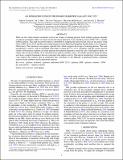AN IONIZATION CONE IN THE DWARF STARBURST GALAXY NGC 5253
Author(s)
Zastrow, Jordan; Oey, M. S.; Veilleux, Sylvain; Martin, Crystal L.; McDonald, Michael A.
DownloadZastrow-2011-An Ionization cone i.pdf (1.049Mb)
PUBLISHER_POLICY
Publisher Policy
Article is made available in accordance with the publisher's policy and may be subject to US copyright law. Please refer to the publisher's site for terms of use.
Terms of use
Metadata
Show full item recordAbstract
There are few observational constraints on how the escape of ionizing photons from starburst galaxies depends on galactic parameters. Here we report on the first major detection of an ionization cone in NGC 5253, a nearby starburst galaxy. This high-excitation feature is identified by mapping the emission-line ratios in the galaxy using [S III] λ9069, [S II] λ6716, and Hα narrowband images from the Maryland-Magellan Tunable Filter at Las Campanas Observatory. The ionization cone appears optically thin, which suggests the escape of ionizing photons. The cone morphology is narrow with an estimated solid angle covering just 3% of 4π steradians, and the young, massive clusters of the nuclear starburst can easily generate the radiation required to ionize the cone. Although less likely, we cannot rule out the possibility of an obscured active galactic nucleus source. An echelle spectrum along the minor axis shows complex kinematics that are consistent with outflow activity. The narrow morphology of the ionization cone supports the scenario that an orientation bias contributes to the difficulty in detecting Lyman continuum emission from starbursts and Lyman break galaxies.
Date issued
2011-10Department
MIT Kavli Institute for Astrophysics and Space ResearchJournal
Astrophysical Journal. Letters
Publisher
IOP Publishing
Citation
Zastrow, Jordan, M. S. Oey, Sylvain Veilleux, Michael McDonald, and Crystal L. Martin. “AN IONIZATION CONE IN THE DWARF STARBURST GALAXY NGC 5253.” The Astrophysical Journal 741, no. 1 (October 12, 2011): L17. © 2011 The American Astronomical Society
Version: Final published version
ISSN
2041-8205
2041-8213